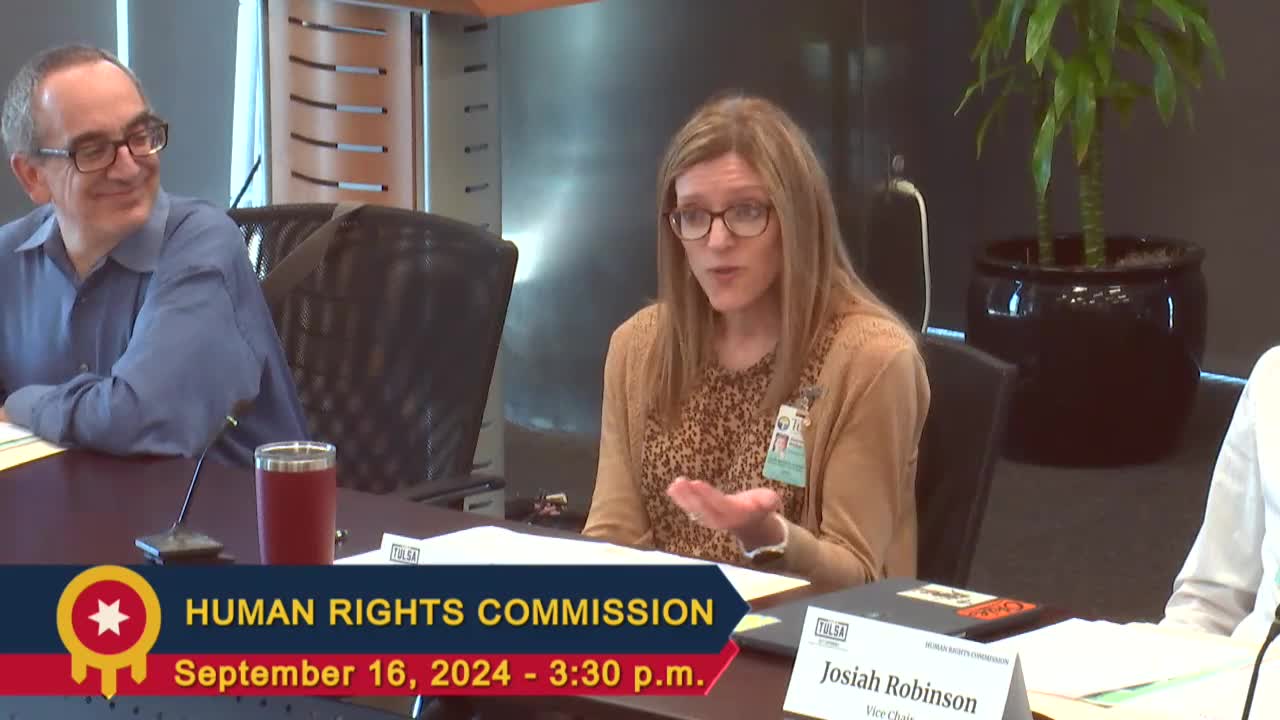Oklahoma's voting system faces urgent reform challenges
September 16, 2024 | Human Rights Commission Meetings, Tulsa, Tulsa County, Oklahoma
This article was created by AI summarizing key points discussed. AI makes mistakes, so for full details and context, please refer to the video of the full meeting. Please report any errors so we can fix them. Report an error »

In a recent government meeting, Oklahoma Appleseed presented a white paper addressing the concerning state of electoral participation in Oklahoma, highlighting a significant decline in voter turnout and proposing six key reforms to enhance voting access. The organization, which focuses on issues of voting justice among others, revealed that Oklahoma ranks near the bottom nationally in electoral participation, with a turnout of only 58.3% in the 2020 presidential election, placing it 49th among the states.
The white paper, available on Oklahoma Appleseed's website, outlines the challenges faced by eligible voters, particularly among racial minorities and individuals with disabilities, who often have the lowest turnout rates. The report cites comprehensive studies, including one from the MIT Election Data and Science Lab, which consistently ranks Oklahoma poorly in electoral administration.
To address these issues, Oklahoma Appleseed recommends six policies aimed at improving voter access and engagement. These include:
1. **Voter Preregistration**: Allowing individuals as young as 16 to preregister to vote, which could help increase turnout among young voters, who had a dismal participation rate of only 30% in 2020.
2. **Election Day Registration**: Implementing same-day registration to boost turnout by an estimated 3 to 7%, as seen in other states.
3. **Extended Early Voting**: Increasing the early voting period, which is currently the shortest in the nation, to make it more accessible for voters.
4. **Permanent Absentee Voting**: Simplifying the absentee voting process, which currently has stringent notarization requirements that deter participation.
5. **Restoration of Voting Rights**: Reforming laws to allow individuals to vote upon release from incarceration, rather than requiring the completion of parole or probation.
6. **Open Primaries**: Exploring the possibility of open primaries to encourage broader participation in the electoral process.
Oklahoma Appleseed emphasized the need for these reforms to ensure that all citizens can effectively participate in democracy, arguing that the state does not have to remain at the bottom of voter turnout rankings. The organization aims to foster consensus and momentum around these proposals in the coming years, advocating for a more inclusive electoral system that upholds the integrity and accessibility of voting.
The white paper, available on Oklahoma Appleseed's website, outlines the challenges faced by eligible voters, particularly among racial minorities and individuals with disabilities, who often have the lowest turnout rates. The report cites comprehensive studies, including one from the MIT Election Data and Science Lab, which consistently ranks Oklahoma poorly in electoral administration.
To address these issues, Oklahoma Appleseed recommends six policies aimed at improving voter access and engagement. These include:
1. **Voter Preregistration**: Allowing individuals as young as 16 to preregister to vote, which could help increase turnout among young voters, who had a dismal participation rate of only 30% in 2020.
2. **Election Day Registration**: Implementing same-day registration to boost turnout by an estimated 3 to 7%, as seen in other states.
3. **Extended Early Voting**: Increasing the early voting period, which is currently the shortest in the nation, to make it more accessible for voters.
4. **Permanent Absentee Voting**: Simplifying the absentee voting process, which currently has stringent notarization requirements that deter participation.
5. **Restoration of Voting Rights**: Reforming laws to allow individuals to vote upon release from incarceration, rather than requiring the completion of parole or probation.
6. **Open Primaries**: Exploring the possibility of open primaries to encourage broader participation in the electoral process.
Oklahoma Appleseed emphasized the need for these reforms to ensure that all citizens can effectively participate in democracy, arguing that the state does not have to remain at the bottom of voter turnout rankings. The organization aims to foster consensus and momentum around these proposals in the coming years, advocating for a more inclusive electoral system that upholds the integrity and accessibility of voting.
View full meeting
This article is based on a recent meeting—watch the full video and explore the complete transcript for deeper insights into the discussion.
View full meeting
